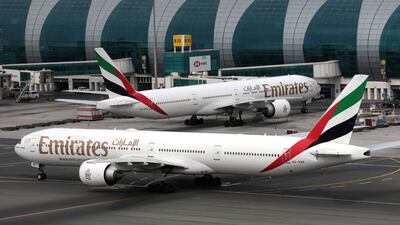A golden age of Middle Eastern aviation is drawing to a close. The growth in demand that has underpinned the incredible expansion of the region's airlines including Emirates, Etihad Airways, Qatar Airways and Turkish Airlines is slowing.
This is natural, after what has been a phenomenal 20-year cycle. It is also a result of the drop in oil prices from the summer 2014 peak of $114 a barrel. Low oil prices help airlines reduce costs, but they also impact economic activity in the region, reducing demand for air travel. We have recently witnessed a situation in which growth in demand for air travel has not recovered, but oil prices have to a greater degree, eroding profit margins for carriers.
This is a period of challenges and changes. Broader industry trends, chief among them technological and engineering advances, are playing an important part. Growing fuel-efficiency is enabling aircraft to fly greater distances at a lower cost. As a result, there will be fewer refuelling stops, less need for transfers and more direct flights.
Since the late 1990s, the Middle East has connected Asia with Europe and beyond. As a result, airports in Dubai, Abu Dhabi, Istanbul and Doha have become regional hubs for intercontinental transfers.
Last year, Dubai International served close to 90 million international passengers – more than any other airport in the world. However, the most striking aspect of its success is the spirit in which it was achieved. In addition to world-class infrastructure, Dubai set a new benchmark for customer service. In an industry dominated by strict, post-9/11 security precautions, making travel as pleasurable as possible was its masterstroke.
The advances made by Middle East carriers became impossible to ignore in 2015/2016, when the big three US airlines launched efforts to block their expansion in what became known as the Open Skies row. Despite a concerted and at times ugly campaign against Emirates, Etihad and Qatar Airways, this dispute over flying rights served only to highlight how poorly treated passengers on US carriers were by comparison.
However, the supremacy of Middle East carriers and that of the hub model will not last forever. The playing field is being levelled by technology, with smaller airlines now able to afford to operate new-generation aircraft and offer similar on-board experiences.
But there is no need to panic. Asia’s aviation sector followed a similar arc, starting in the 1970s and ending with the region’s financial crisis of the late 1990s and the outbreak of the Sars epidemic in the early 2000s.
Today, Asian airports, including those in China and India, are the fastest-growing in the world, while carriers such as Air Asia are at the forefront of how technology is being used to create more dynamic and flexible air transport for both people and goods.
Meanwhile, in the fiercely competitive and lucrative transatlantic market, companies such as Norwegian Air have shown that it is possible to disrupt more established carriers. However, despite its success in grabbing market share, Norwegian Air has struggled with the pace of its own expansion. Fortunately, there is still time to adjust and set the right path for the future.
Back in the UAE, Emirates has always said that it is more than just an airline, aiming to be a global connector through its Dubai hub. Tim Clark, its president, told The National this week that as it evolves its fleet of aircraft, its network will "take on a different form". Emirates is certainly not sitting still while the world changes around it.
Abu Dhabi's Etihad is also going through a transition that it hopes will position it for sustainable success, rather than trying to maintain the rapid expansion of the past. Inevitably, this all means a more homogenous aviation landscape, making it much harder for the region's airlines to stand out as clearly as they have in the past.
Perhaps flying won't feel as special as it has for the past 20 years, thanks to the efforts of the UAE's airlines. However, recent efforts by Emirates and Etihad to highlight how the industry can offset its carbon footprint indicate that the next era for global aviation might be a more environmentally conscious one. That could be a truly golden age for us all.
Mustafa Alrawi is an assistant editor-in-chief at The National


